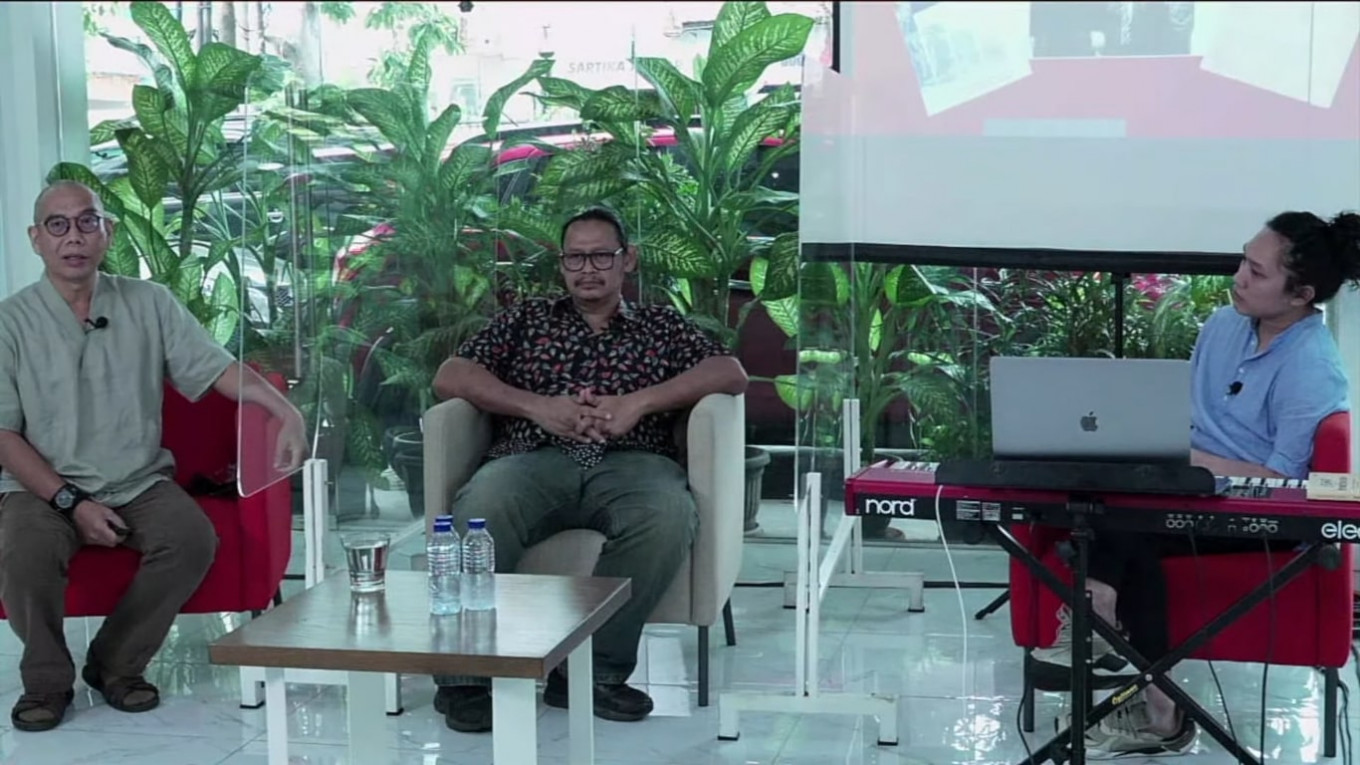Popular Reads
Top Results
Can't find what you're looking for?
View all search resultsPopular Reads
Top Results
Can't find what you're looking for?
View all search resultsIn his new book, art observer Syakieb Sungkar dives into the philosopher’s mind
Launching one of the few books in Indonesian about philosopher Adorno, art observer Syakieb Sungkar brings examples from the art world into the discussion.
Change text size
Gift Premium Articles
to Anyone
 Deep talks: Dr. Simon Petrus Lili Tjahjadi (left), Syakieb Sungkar (center) and Sri Hanuraga discuss during Syakieb's book launch for "Seni Sebagai Pembebasan: Sebuah Telaah tentang Estetika Adorno" (Art as Liberation: A Study of Adorno’s Aesthetics) on philosopher Adorno on Mar. 11. (YouTube/Courtesy of Teater Utan Kayu) (YouTube/Courtesy of Teater Utan Kayu)
Deep talks: Dr. Simon Petrus Lili Tjahjadi (left), Syakieb Sungkar (center) and Sri Hanuraga discuss during Syakieb's book launch for "Seni Sebagai Pembebasan: Sebuah Telaah tentang Estetika Adorno" (Art as Liberation: A Study of Adorno’s Aesthetics) on philosopher Adorno on Mar. 11. (YouTube/Courtesy of Teater Utan Kayu) (YouTube/Courtesy of Teater Utan Kayu)
L
aunching one of the few books in Indonesian about philosopher Adorno, art observer Syakieb Sungkar brought in examples from the art world in the discussion.
As an influential figure in critical theory, German thinker Theodor W. Adorno was many things: he was a philosopher, sociologist, psychologist, musicologist and composer. So, it was only logical for author Syakieb Sungkar to invite a lecturer in philosophy as well as a musician to his book launch about Adorno.
On Friday afternoon, gathered at Komunitas Utan Kayu, East Jakarta, under cloudy skies, Syakieb was seated with Driyarkara College of Philosophy (STF Driyarkara) lecturer Simon Petrus Lili Tjahjadi and contemporary jazz pianist Sri “Aga” Hanuraga. The book launch was also streamed online on Teater Utan Kayu’s YouTube channel. Writer Ayu Utami moderated the event.
“Until now, [Adorno] remains a material that enriches artists' thoughts whenever they talk about the role of art in society,” said Ayu Utami.
Titled Seni Sebagai Pembebasan: Sebuah Telaah tentang Estetika Adorno (Art as Liberation: A Study of Adorno’s Aesthetics), Syakieb Sungkar wrote the book to reconstruct the great thinker’s perception of art in his defining 1970’s book Aesthetic Theory. It serves as a reference for those who are interested in philosophy in general, especially for readers already familiar with the revered Frankfurt School thinker, who want to know more about Adorno's takes on art.
Syakieb himself is an art observer and editor-in-chief of Jurnal Filsafat Dekonstruksi (Journal of Deconstruction Philosophy). He continued his graduate study at STF Driyarkara in 2020 because of his love for art and philosophy.
“With clear, focused, but still flowing language, the author reconstructs Adorno's thoughts on art [...] Not only that, but he also gives his critical response to Adorno's thoughts at the end, beyond the reconstruction of him he had previously made,” said Simon Petrus in his review of Syakieb’s book.
Talks about Adorno began to enter philosophy and art circles in Indonesia in the 1980s following Sindhunata and his book Dilema Usaha Manusia Rasional (The Dilemma of Rational Humans’ Effort). Then Goenawan Mohamad, to whom Syakieb gave this book, began consistently bringing Adorno into debates about the role of art in society in the 1990s.
During the discussion, Simon talked about the Frankfurt School thinkers, who were mostly Jewish and had endured a period of terrible persecution in Nazi Germany. Some ended up fleeing to the United States.
“[The Frankfurt School thinkers] had a question: Why had humanity, instead of entering a more humane era thanks to modernity and enlightenment, sunk further into a new barbarism? That new barbarism manifested itself in German’s racism,” Simon explained.
Simon shared how the Frankfurt School and Adorno's thoughts influenced the new left and antiestablishment movements.
The discussion moved to more musical aspects, and the relationship between Adorno and his criticism of representative music, especially from the 19th century.
"Basically, music is like language," said Aga, a lecturer and head of the Jazz and Pop Department at the School of Music at Pelita Harapan University.
“Musical material presents certain meanings and emotions based on conventions that develop over time,” Aga said.
Syakieb explained that Adorno, who was very anti-pop music and popular culture in general, heard music on the radio when he was in the US and hated it. The songs were repetitive and only lasted for three minutes.
“He was angry because such a culture existed. He likened America to [Germany’s] Hitler, whose whole culture, art, music and film were set to control their people. ‘What's the difference between America and Germany?’ he thought,” said Syakieb.
Adorno believed in his writing that art must be the antithesis and critique of society, and only good art could help people “regain” their consciousness, the three speakers concluded.










